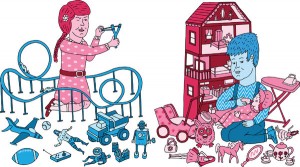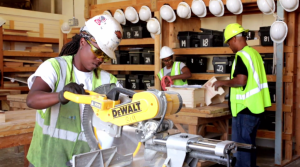by Meera Sachdeva, Change Maker
Gender roles are social norms individuals of each gender are expected to abide by. For example, in many societies, men are expected to be breadwinners while women are expected to stay at home and take care of the family.
The problem with gender roles is that they inherently punish people who deviate from the norm. They may only cease to exist if enough people break out of them but until the social stigma is removed, this will remain a challenge.
Another issue with fixed gender roles is the perpetuation of gender stereotypes that men dominate and women are subservient. These seemingly small issues escalate to serious problems like sexual violence. Tackling these problems requires attacking the root of the problem: gender roles.
 Women in the Military
Women in the Military
We spoke to 25-year-old Sumita who joined the military as a full-time officer at the age of 21. Sumita was inspired to follow this path by her uncle, who has served in the army for over three decades. In her experience, military training is equally challenging for men and women, and more women should contribute to the defence sector.
She shared, “Being in the army is really different from what women in Singapore think it’s like. It’s a completely different world. Yes, it’s mostly men, but they’re are just as afraid of what’s going on as you are.”
Sumita also debunked the misconception that men are automatically more suited to military life by sheer physical strength. “There are different ways to contribute in the army. Medics are equally important as those fighting on the field. The guys in my generation are a lot more willing to accept women as soldiers.”
We also spoke to Sylvia, a mother of three who shared her experience in the construction industry. Getting her foot in the door was a challenge, but Sylvia was determined to get hands-on experience in the field.
“My boss who had a small construction company needed a project team and I came in handy because I’d studied building. You’re working with mostly men; no boss would take the risk to see whether a woman can “survive”. If it weren’t for my boss it would be tough to get into that kind of job.”
Sylvia’s husband is equally supportive of her choices. “He never once suggested that I stop working….and whenever I have to work longer hours, my husband would take care of the kids.”
Her advice to women trying to break into a male-dominated industry? “It’s about who you are, your ability, your passion, being good at what you do and having the attitude required to learn in order to excel. Don’t let your gender stop you from doing what you want.”
 Stay At Home Fathers
Stay At Home Fathers
Thien Yew, a father of two, chose to be a stay-at-home father from 2001-2008 while his wife became the primary breadwinner. They decided it would be beneficial to have a parent at home since their younger son was just entering secondary school.
“Those years that I spent with my sons were a wonderful takeaway. All of us benefitted from the arrangement. On one hand, I was able to understand their lives in school, what they go through, their friends, and the teachers they interact with. On the other, they were happy to have a chauffeur and some company after school!”
Thien Yew opined, in response to an AWARE survey that showed 57% of men aged 18-29 believe that men should be the head of the household, that, “Singapore has progressed to a stage where women are generally accepted as capable and competent in their careers. The problem lies in traditional mindsets, but that’s changing. Women of the younger generation are keen to have their own equally successful careers.” However, he acknowledged that gender inequality in the workplace is still vast.
Thien Yew also shared that stay-at-home fathers are increasingly common and there needs to be open communication between couples to determine the values both parties mutually want to uphold.
Evidently, Singaporeans are able to treat people not conforming to gender roles without judgement or discrimination. Why, then, aren’t more people breaking out?
It’s because gender moulds are deeply entrenched in societal mindsets that any alternative is rarely considered. If children are thrust into their roles since birth, it’s substantially harder to break free.
Moreover, breaking gender roles is not solely a women’s issue. Without them, men are able to spend more time with their kids, with less pressure as a breadwinner, while women are able to pursue fulfilling careers they want.
If breaking out of the gender mould benefits everyone and is clearly the way forward, why is it taking us so long to get there?
About the Author:
Meer a is a Grade 12 student at United World College. She enjoys debating, playing the guitar and drums and playing tennis with her sisters. In her spare time, she also likes writing about issues she is passionate about and believes strongly in encouraging empathy to fix entrenched problems like gender inequality. She is interested in Politics and Economics and how these fields can be used to better the lives of disadvantaged people.
a is a Grade 12 student at United World College. She enjoys debating, playing the guitar and drums and playing tennis with her sisters. In her spare time, she also likes writing about issues she is passionate about and believes strongly in encouraging empathy to fix entrenched problems like gender inequality. She is interested in Politics and Economics and how these fields can be used to better the lives of disadvantaged people.

